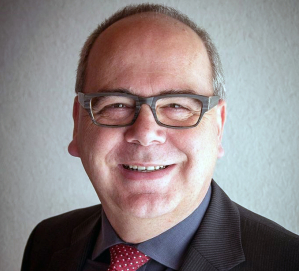
Andreas Wenzel of Germany is the new elected president of the European Evangelical Alliance. He succeeds Rev. Dr. Frank Hinkelmann, who concluded 12 years in the role. The evangelical alliance shared the following interview insights from Wenzel with Christian Daily International about his background, and vision for evangelism and discipleship.
Can you share a bit about your personal background and ministry journey, including how your faith in Christ has shaped your involvement with Word of Life Germany and Europe, and eventually led you to the EEA Board over the past eight years (since you first came on the board of the EEA in 2017)?
God placed me in a typical Christian family of the 60s, with influences from several people. My blind grandfather was my spiritual hero. He completely trusted God and His Word, as well as His love, grace and care. His prayer life and love for Jesus and world mission was outstanding and definitely had a great impact into my calling into Christian ministry.
Together with my wife Esther (from Switzerland, we are blessed with 4 adult children and 7 grandchildren under 7 years of age), we prayed for God’s wisdom how and where to invest our lives. After studying Theology and working as a youth pastor, God confirmed to join the ministry of Word of Life Germany full time. As the second generation team, we ran camps, musicals, evangelistic events and enjoyed to see God at work in so many young people’s lives. We also invested in evangelistic endeavors of the regional and national Evangelical Alliance. This led to participation on board levels of evangelical youth networks and finally to membership in the Evangelical Alliance in Germany. Its’ leadership had asked me to join the European Evangelical Alliance on their behalf.
As you step into the presidency of the EEA, what is your overarching vision for fostering unity among evangelicals across Europe, and how does this align with biblical principles such as those found in Ephesians 4:3 about maintaining the unity of the Spirit?
The vision of the Apostle Paul in Ephesians 4:3 goes back to chapter 3:6. “Jewish and Gentile Christians are coheirs, members of the same body partners of the promise in Christ Jesus through the gospel” and roots in Jesus’s revelation of His kingdom. My prayer is that we as followers of the Messiah “will be rooted and firmly established in love that surpasses knowledge” (V17.19). Paul is absolutely in favor of knowledge and sound teaching, but emphasizes its limits and partiality. The overarching biblical principles are faith, hope and love (1Cor 13). The front that we should focus on is how to reach people with the best message of all times. Love for one another in the Christian world is – according to Jesus – a great testimony to the unbelieving world around us.
What specific plans do you have to advance evangelism and discipleship within the EEA, particularly in equipping young leaders, and how do you see God's calling playing a role in these initiatives?
As European Evangelical Alliance we continue to engage in the same five values that are essential to all national alliances (in similar wording): Prayer, Bible, Evangelism / Mission, Unity, Social / Environmental Responsibility. As board, leadership-team and staff we seek to implement what we have defined in our Vision, Mission and Values Statement. Every area needs attention to live up to our calling. In light of a multitude of initiatives regarding evangelism and discipleship worldwide and in Europe, it is our desire and concern to foster a better communication and collaboration of the active players. We believe that doing it together honors Christ and helps us all to focus and reach by far more than churches, ministries or initiatives doing it just “their way”. The Hope Conference in 2026 will provide a great platform for this. In addition, the young leaders can teach us a lot, especially when we talk about reaching the next generation with the gospel. We need to give them our ears and open the doors for ministry.
In light of the challenges facing the evangelical community in Europe today—such as secularism and religious freedom issues—how will your faith-driven leadership guide the EEA's advocacy efforts, perhaps drawing inspiration from scriptures like Matthew 5:13-16 on being salt and light?
I am so thankful for our great staff that is tirelessly working in these areas and for all our partners and networks who have contributed substantially. Often, we have reacted to current issues and developments of our world in Europe (and beyond) – and that is what we ought to do. Politicians in Brussels or on national or regional levels need to know what we as Christians stand for and why. They need good reasoning to form their own convictions.
At the same time, some of our inputs have been of a more basic approach (like the charter of conscience). In the public square this is an outstanding document with long term effects. In a divergent society that seems to fall apart into numerous social groups and agitating minorities trying to gain control over what is politically correct and what is condemnable, the charter gives a great help to argue on the basis of human rights for the freedom of thought, conscience and belief.
What a great way to be salt in our society and shining as a light on a hill – we have not been called to hide, but to stand up and share the good works and the good news in public. My prayer is that we Christians will serve as a prophetic voice – inviting people around us to trust in the same God we do. He is truth – and He is awesome!
With our endeavors, papers and seminars we also seek to enrich and ignite the church in their ways of proclamation and campaigning. Please check the many resources related to our efforts on our website as well as the introduction to the great bouquet of pan-European networks!
Looking ahead, how do you envision the EEA contributing to spiritual renewal on the continent, and what personal prayers or faith commitments will sustain you in this role as you seek to fulfill God's mission for the Alliance?
Spiritual renewal and revival is on God’s agenda – and therefor on ours as well. Prayer has always been a key factor, as well as repentance, reconciliation and the call for holiness. Often, also in biblical times, adversity and suffering have caused people to draw to God. If God’s call to receive mercy is ignored, He has allowed other circumstances to make us aware of our spiritual need.
As EEA we highlight and foster to pray together beyond our church relations – not only in the annual week of prayer. It is the key in all our areas of involvement and governs our personal lives as well as our meetings. We are dependent on God and His answers to prayer. We want to walk close to His side. And we cherish those who come alongside and partner with us in our walk with Him and one another with their prayers, ideas, involvements, projects and support.





